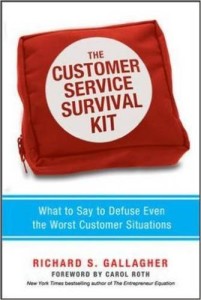 Quick question: why are you here on CarolRoth.com? Yes, she is a great small business strategist, a lovely person, and one of quickest wits in the business community. But I am guessing you first heard of her through her media platform. Which in turn was fueled by a first book, The Entrepreneur Equation, that quickly became a New York Times bestseller.
Quick question: why are you here on CarolRoth.com? Yes, she is a great small business strategist, a lovely person, and one of quickest wits in the business community. But I am guessing you first heard of her through her media platform. Which in turn was fueled by a first book, The Entrepreneur Equation, that quickly became a New York Times bestseller.
Her success – and mine – were both supercharged by what I feel is one of the most powerful marketing tools any solo entrepreneur could have: a successful royalty-published book. While I have nothing whatsoever against the honorable craft of self-publishing, books from royalty publishers are much more likely to get stocked in bookstores, attract interviews from major media outlets, and draw potential clients to your business. So I am going to focus here on how you, too, can join the club.
The lingua fraca of nonfiction agents and publishers is a book proposal: a 30 to 50 page summary, market analysis and chapter sample of your book. Create a successful one, and you stand your very best chance of being offered a contract to write the book itself. And frankly it is a great system for you, the author, because you get to sell your book before actually writing it.
So here is the unspoken, dirty secret of nonfiction publishing: the vast majority of book proposals are terrible. They pitch books that are poorly written, tone-deaf to the market, and will never sell. Which means that if you nail the art of the successful proposal, you – yes, you – stand a better than average chance of being on real bookshelves around the country. And doing this is easier than you think, as long as you learn to master these five key areas:
1. The query. The most important part of a proposal isn’t even in the proposal. It is the 2-3 paragraph pitch you will email to agents or publishers to get them interested in seeing it. Keep it tight, focused, and short: the title, one or more irresistible reasons why this book will be successful, and why you are the perfect person to write it.
2. The title. Study the titles of successful books, and almost all of them have one thing in common: they get to the point with a huge benefit. Think and Grow Rich. How to Win Friends and Influence People. The 4-Hour Workweek. The Entrepreneur Equation. Start with the biggest, juiciest benefit you can offer a reader, think of how you would pitch it to your best friend, and keep it simple.
3. The competitive analysis. Now we are jumping to the middle of your proposal – and the place where agents and editors will probably look first, to answer their single most burning question: will it sell? The worst thing you can have is a “unique” book with no competition, and the best thing you can have is a well-articulated benefit over books that already sell really well.
4. The first five pages of your sample chapter(s). Next to the most important question (Will it sell?), the next two most important questions are “Can you write like a published author?” and “Are you a sane, functioning member of society?” They usually will be able to tell both of these things after reading a few pages of your stuff. Study other published authors, see how they structure their chapters and key points, and work hard to smell like them.
5. Your bio. Your platform matters. All is not lost if you currently have a small one, but any track record of speaking, media exposure and/or business success can add a lot of value to your proposal.
Notice I didn’t mention some other key parts of a proposal, including the synopsis (your title should do the real work), your detailed outline (editors will make up their mind before they get that far), and your marketing plan (important, but not as important as your platform). And of course, before you get started, study the format of good proposals from reference books, and even some publisher websites.
If you’ve ever dreamed of becoming a published author, sweat the details in these five areas. Those who do usually get published eventually, and those who don’t usually don’t. It’s as simple as that. Best of success!

